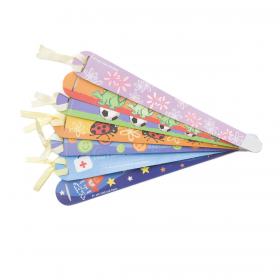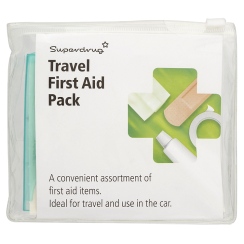
1) Take European Health Insurance Cards for the whole family when holidaying in the EU to guarantee free emergency health treatment. Trust us, it will streamline the whole process if one of the kids needs admitted to A&E and will leave you free to worry about their welfare. Just remember to apply for these a couple of months before you travel.
2) Do a bit of research before you travel and find out family safe areas, any potential health pitfalls or places to avoid – particularly if you’ve never been to that destination before.
3) Arm your children with ID wristbands from the likes of Labels4Kids so that if you become separated, they can be identified and returned safely to you. A good wristband should carry all the relevant information, including their name and a contact telephone number and/or address for you. 
4) If your child has any allergies to the likes of penicillin or nuts, or medical conditions, such as epilepsy or diabetes, think about ordering an ID wristband for this too. If you become separated, foreign authorities, doctors and hotel staff will have a better understanding of their needs and be able to administer or organise the right medication or treatment.
5) Before you leave, always let someone at home know where you are going and give them the contact details of the hotel you are staying at so people know your whereabouts and can get in touch if older children are staying at home.
6) Pack a basic First Aid Kit to take with you and don’t forget to include a thermometer, plasters, wipes and antiseptic cream to cover you for anything from flu to sunstroke. We love this one from Superdrug. 
7) Don’t leave home without all necessary medication and add occasional medicines like Calpol, electrolyte solution and Milk of Magnesia in case of fever, diarrhea or constipation.
8) Don’t forget to take a phrase book if you’re not fluent in the language – this can really help when visiting pharmacies, doctors and hospitals abroad or even talking to police.
9) Whenever you arrive at your hotel, run through emergency procedures with your children. Show them where the emergency exits are and explain what they should do in case of a fire, covering escape routes and how to avoid smoke inhalation.
10) Always have a plan in case you become separated while out and about. Choose a central rendezvous point, for example, where you can all meet up again after being carried off in the crowds or split up in an attraction queue.
11) Make sure your children have your mobile contact details and name of the hotel they are staying in written down and in their pockets even if they have their own phones. That way, even if they lose their phone, they will still be able get in touch. It helps to arm them with some small change too.
12) If you are travelling with toddlers or pre-schoolers, invest in a harness or wrist strap for when out and about in large crowds and when they’re not riding in a buggy. It’s an old cliché but prevention is better than cure i.e. better to keep them permanently beside you than have to track them down when they’re gone.
13) Warn your children about the dangers of talking to strangers, crossing roads etc etc… all the usual safety advice but be sure to recap when going abroad.
14) It goes without saying, but don’t leave your children alone. If you are popping out of the hotel room, make sure it’s just to the hotel lobby and be sure to lock the door.
15) Similarly, make sure all doors and windows are secure at night and never leave your child with someone they don’t know.
16) Always supervise your children in water i.e. in the pool or at the beach. Never let them get out of their depth and make sure you have arm bands for water parks etc if they’re not strong swimmers.
17) Get airline safety savvy and be sure you know what to do in the event of an emergency on board the aircraft. Pay attention during the in-flight safety demonstration, read the hand held guide and don’t forget to put your oxygen mask on first in event of emergency. That way, you are far more likely to be able to help your children and other passengers with theirs.
18) Make sure your children wear their seatbelts on the plane. If they’re particularly young, cabin crew should be able to give you a special extension which will cover both of you while they’re sitting on your knee.
19) Always observe country-specific customs and dress codes to avoid drawing unnecessary attention to yourselves and the children. Stay aware of who is watching or seems to be in all the same places as your family and report any suspicious behaviour to the authorities.
20) Finally – and this one seems really obvious – but don’t forget the sunscreen if you’re flying somewhere hot!



